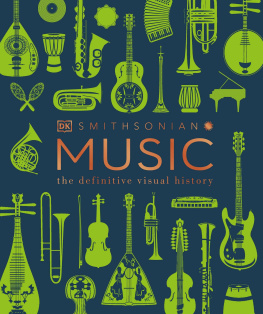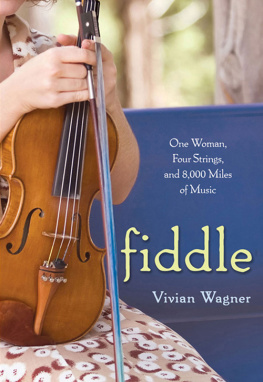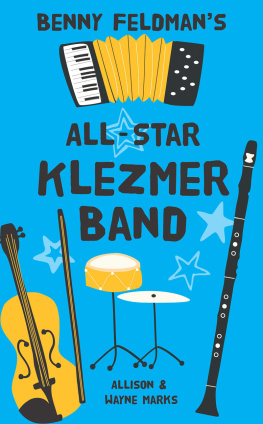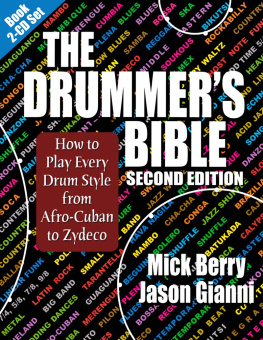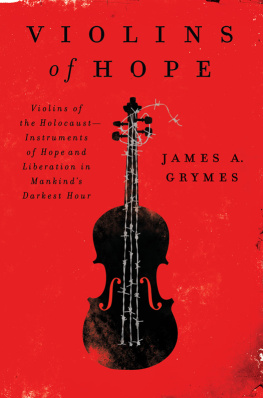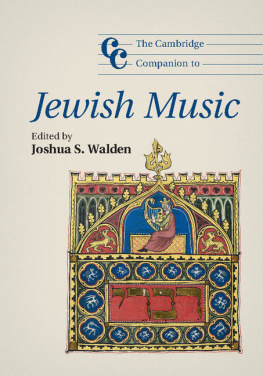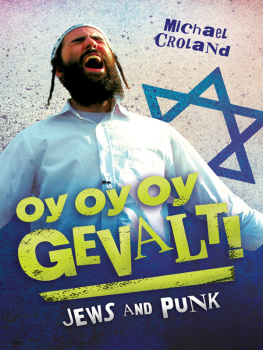THE ESSENTIAL
KLEZMER
A Music Lovers Guide to Jewish Roots and Soul Music, from the Old World to the Jazz Age to the Downtown Avant-Garde
by SETH ROGOVOY

Algonquin Books of Chapel Hill 2000
Published by
Algonquin Books of Chapel Hill
Post Office Box 2225
Chapel Hill, North Carolina 27515-2225
a division of
Workman Publishing
225 Varick Street
New York, New York 10014
2000 by Seth Rogovoy. All rights reserved.
Published simultaneously in Canada by Thomas Allen & Son Limited.
Design by Anne Winslow.
Map illustration by Jackie Johnson.
For permission to use excerpts from copyrighted works, grateful acknowledgment is made to copyright holders on , which constitutes an extension of the copyright page.
Library of Congress Cataloging-in-Publication data is available for a previous edition of this work.
eISBN 9781565128637
Dedication
This book is dedicated to my grandfather, Baruch Lazar Peretz (19081981), of blessed memory, whose singing instilled in me a love for the sound of the khazones, and to my grandmother, Rose Schiff Peretz, whose strength of will has been a tremendous inspiration and whose love has been the greatest gift.
This book is also for Anna and Willie, their great-grandchildren, coiners of the term real klezmer. They know it when they hear it.
Contents
ACKNOWLEDGMENTS
This is my first book, and therefore it feels only right to credit everyone who helped me along the way in my career as a writer. Ive been fortunate to work with the best of editors, including Tom Bleezarde at the Williams Alumni Review, Jon Garelick at the Boston Phoenix, Seth Lipsky and Jonathan Rosen at the Forward, Mark Moss at Sing Out! magazine, David Holzel at Moment magazine, and Laurie Muchnick at Newsday.
For over a dozen years Ive been a music critic and columnist at the Berkshire Eagle in Pittsfield, Massachusetts, one of the best small newspapers in America, in large part due to editors such as Nada Samuels, David Scribner, Charles Bonenti, Clarence Fanto, and Lesley Ann Beck. I owe my deepest gratitude to Jeffrey Borak, who gets the lions share of the credit for getting me started writing about music and keeping me going through good times and bad, and to Randall Howe, a friend first and foremost, but also a great editor.
One of the best things about writing this book has been enjoying the friendship and support of so many of the musicians who made it all happen in the first place. I am especially indebted to Alan Bern, Hankus Netsky, Lev Liberman, and Michael Alpert for their incredible generosity in opening up their hearts, minds, and archives to me. Thanks also to Frank London, Alicia Svigals, Andy Statman, Henry Sapoznik, Gary Lucas, David Krakauer, Ben Goldberg, David Licht, Lorin Sklamberg, Pete Rushefsky, Stuart Brotman, Itzhak Perlman, David Buchbinder, Joel Rubin, Matt Darriau, Merlin Shepherd, Sherry Mayrent, Eve Sicular, Yosl Kurland, Bob Gluck, Jeff Baker, my dads friend Eddie Fleishman (who played with the greats, including Naftule Brandwein and Dave Tarras), and the feisty and frustrating but eminently inspiring and lovable John Zorn. All these musicians gave freely and generously of their time and help.
Special thanks to Wolf Krakowski and Paula Parsky, for friendship and Yiddish hekhsher and translation. Thanks also to all the musicians of the past and present, simply for making the music, and to all the authors of liner notesklezmer liner notes are the best!
This book is lovingly illustrated thanks in part to the following photographers and archivists: Lloyd Wolf, Clemens Kalischer, Enid Farber, and Emily Botein at the Center for Traditional Music and Dance, Neil Zagorin at the National Yiddish Book Center, and the folks at YIVO.
I owe a debt of gratitude to my hometown writing pals for their steady emotional support and encouragement throughout the entire process that saw this book through from conception to reality: Jane and Peter Smith, Darra Goldstein and Dean Crawford, Jim and Karen Shepard, Paul Park, and most especially, to Michael Gizzi, a great friend as well as a great poet.
Thanks also to Jared Polens and Jesse Milden for their ongoing interest in my work and for the long-term loans of records and CDs from their own collections, to Jamaica Kincaid for her encouragement, and to Dr. Jeffrey A. Toretsky, for being an early and enthusiastic reader of my manuscript. Other friends who made up a worldwide clipping service as well as a far-flung research and support network included Karen Karp, Harold Lepidus, Peter Stone Brown, Jeffrey Gaskill, Dianne Haas, and Aunt Marsha (she hates it when I call her thatI mean Marsha Peretz Spyros).
Living in a college town meant help was close at hand from my musicologist friends Otha Day and Jennifer Bloxam at Williams College, as well as the research and loan staff at Sawyer Library and at the Williamstown Public Library. I also want to thank my two best teachers, Richard Ford and Larry Fuchser, whose influence on how I think, read, listen, and write went far beyond the confines of the classroom.
I had help tracking down recordings from two of the best mail-order retailers specializing in Jewish music, Tara Music in Maryland and Hatikvah in Los Angeles. Special thanks especially to Zippy Freedman and Mayer Pasternak at Tara. Also thanks to Hal March at Toonerville Trolley Records right here in Williamstown, Massachusetts.
Thanks also to all the managers, agents, publicists, and record company folk who helped out, including Kazunori Sugiyama at Tzadik Records; Brian Coleman at Braithwaite & Katz; Itzik Becher with the Klezmatics; Joan Sherman with Brave Old World; Steve Burton, Kerry Murphy, Steve Netsky, and Glenn Dicker at Rounder Records; Judith Joiner and Lisa Pardini at Green Linnet/Xenophile; Cindy Byram and Charlie Dahan at Shanachie Records; Harold Hagopian at Traditional Crossroads; Emilie Liepa at Red House Records; Randy Haecker at Sony Legacy; and Sonya Kolowrat at Rykodisc. Thanks also to my friend Michaela OBrien at Young-Hunter Publicity.
This was the book I was destined to write, but it took Gareth Esersky, my friend and agent, to tell me so. That she found my book a home at Algonquin, where Ive enjoyed the great fortune of working with editor Duncan Murrell, is all the more amazing. Thanks also to Dana Stamey, Ina Stern, and everyone else at Algonquin.
I can never thank my parents enough for their unstinting support of everything Ive done throughout my life, but thanks to Lawrence and Stella Rogovoy anyway. Thanks also to the mekhutonim, Judith and Ben Watkins, for their enthusiastic interest and support.
I owe the greatest thanks and gratitude to my wife, Karinwithout whose support and encouragement I would never have even begun writing about musicand to my children, Anna and Willie, whose immediate and ongoing enthusiasm for klezmer was infectious and essential to the completion of this book. I hope you like it.
NOTES ON USAGE AND STYLE
This book is written for the general reader, and therefore I have attempted to keep the use of technical musical terms and Yiddish words to a reasonable minimum. Given the nature of the subject, however, in some cases the use of such terms could not be avoided. Yiddish words are italicized and defined upon their first introduction in the text. For those who dont read from beginning to end, and who might therefore meet up with a strange-looking word in the middle of the book, glossaries of all Yiddish and musical terms defined in the text and used more than once are also provided in the appendix.


